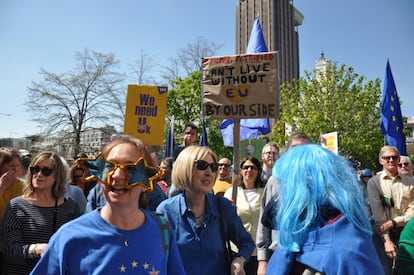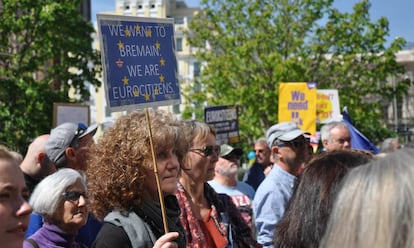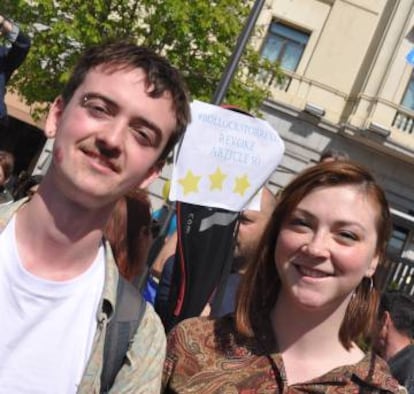As London marches against Brexit, British migrants do their bit in Madrid
Around 400 people came out to protest against the UK’s exit from the European Union on Saturday, demanding a “people’s vote” on what happens next

As around a million people marched through London on Saturday to demand a “people’s vote” on the United Kingdom’s withdrawal from the European Union, there was a more modest affair going on at the same time in the Spanish capital. But the passions among the attendees at the demonstration in Madrid were running just as high as they were at the other Brexit march that day, with British migrants deeply concerned as to how the process could affect their rights, their futures and their lives in Spain.
The event had been organized by EuroCitizens, one of the many protest groups to spring up in the wake of the 2016 referendum on leaving the European Union, which saw “leave” win by 52%, compared to 48% for remain. Part of the British in Europe coalition, the EuroCitizens group has been working during the Brexit process to defend the rights of British citizens to live, work and study in European Union countries.
According to the organizers, around 400 people turned out in Madrid’s Plaza Margaret Thatcher, just by Colón square, to protest against the UK’s exit from the 28-country bloc and to show their support for a people’s vote on what happens next in the process.
Carrying placards and flags, the crowd chanted slogans in English and Spanish, such as “We want our rights, not Brexit!”
The crowd was made up of a mix of ages and nationalities, and attracted workers, students and retirees alike. Carrying placards and flags, and with blue wigs, face paints and other fancy dress, the crowd chanted slogans in English and Spanish, such as “¡Derechos sí, Brexit no!” (“We want our rights, not Brexit!”), and most memorably, “Bollocks to Brexit!”
“It’s an absolute shambles. It should never have happened,” explained Daisy Arundel, who lives in London but was in Madrid visiting friends last week. She was sporting a large sign that read “17,410,742 people need a good spanking,” in reference to the number of people who voted in the referendum to leave. “My closest friends live here and I came a couple of days in advance to see them and to take part in the demonstration. All my friends and family are taking part in the one at home. My dad’s Scottish, my mum’s French and I was brought up in Europe most of my life – Paris, Vienna, Brussels, Copenhagen, Warsaw, Madrid…”

Daisy’s friend, Emily Jones, also from London but now living in Madrid, was also keen to stress her European credentials. “When you’re a Londoner, you’re a Londoner and then you’re European.” How did she feel after the 2016 vote? “Devastated. I cried for two days. It was just the worst decision ever.” In the case of a hard Brexit, Emily said that she and her family would take drastic action. “I really think I would consider getting Spanish passports, giving up our British nationality and becoming fully fledged Europeans. I want my kids to be able to work in Paris or Berlin. That’s a huge decision, and it’s not one I particularly want to make.”
I really think I would consider getting Spanish passports, giving up our British nationality and becoming fully fledged Europeans
Emily Jones, from London
Paul Whidby was at the demonstration with his Spanish wife and two young children. He’s been living in Madrid for 12 years, and said he thinks that Brexit is “a mess.” “It was always a bad idea in my personal opinion, but I think that the last two or three years have reinforced that. Statements that were made during the original campaign were clearly wrong and so that’s why there needs to be a second vote to be sure that people are making the decision based on the real facts.” And what does he think will happen during this key week for the Brexit process? “It’s a lottery, it’s impossible to tell. What we hope for is that there is a vote. It seems unlikely based on what we can see at the moment but we live in hope.”
English teachers Olly and Rhiannon were also at the march, the former having lived in Madrid since September, and the latter having just arrived after two years in Bilbao. Rhiannon said that she was finding the whole process “frustrating.” “It’s scary sometimes, because you don’t know what’s going on.” Would a hard Brexit make her change her plans? “I’ll do everything I can to stay.”

Olly, meanwhile, sounded calm about his future in Spain. “Luckily the Spanish government has been very generous with what they’ve offered,” he said, in reference to Prime Minister Pedro Sánchez’s recent pledge to ensure residency for the 400,000 or so Britons resident in the country in the case of a hard Brexit. “The one problem is freedom of movement. So to move to France or Italy, or somewhere afterwards, that would be difficult. But it seems like we’re fine to stay now that we’ve moved.”
Addressing the crowd, Camilla Hillier-Fry, vice-chair of EuroCitizens, highlighted the work that the group had done to keep dialogue open with the Spanish administrations throughout the Brexit process. “We truly hope that Spain continues to be as inclusive and welcoming as it has been until now,” she told the crowd. “And that these contingency measures that give us some peace of mind will be properly communicated to every town council and police station throughout Spain, ensuring that all British residents are treated equally. We want to keep on being a part of Spanish society.”
I hope Theresa May will be forced to resign, they will be forced to have an election, and that will mean an extension of Article 50
Philip Waring, resident of Alicante
Philip Waring made the trip to the Spanish capital especially for Saturday’s demonstration. He is from London originally, but made the move to live in Alicante on Spain’s eastern coast in September due to the Brexit process. “We were just so scared about what’s happening in the country,” he said about his decision to leave the UK. “I could see how bad this could get, even if we beat it. Having lived in the UK, it’s not very nice there, it’s scary – people are divided.” Philip, who has taken early retirement, lamented the uncertainty that he and other British migrants have been plunged into during the ongoing process. But he ventured a prediction as to what would happen next. “I hope [British Prime Minister] Theresa May will be forced to resign, they will be forced to have an election, and that will mean an extension of Article 50,” he said, the latter a reference to the clause in the Treaty of Lisbon that gives any EU member state the right to quit the bloc. And in the case of a hard Brexit, and the difficulties that could entail for British migrants in Spain, would he try to stay rather than return to the UK? “Definitely,” came his reply. “I don’t want to go and live in a fascist country.”
Whatever the outcome of this crunch week for the Brexit process, it’s clear that passions will continue to run high among British migrants in Spain.
Tu suscripción se está usando en otro dispositivo
¿Quieres añadir otro usuario a tu suscripción?
Si continúas leyendo en este dispositivo, no se podrá leer en el otro.
FlechaTu suscripción se está usando en otro dispositivo y solo puedes acceder a EL PAÍS desde un dispositivo a la vez.
Si quieres compartir tu cuenta, cambia tu suscripción a la modalidad Premium, así podrás añadir otro usuario. Cada uno accederá con su propia cuenta de email, lo que os permitirá personalizar vuestra experiencia en EL PAÍS.
¿Tienes una suscripción de empresa? Accede aquí para contratar más cuentas.
En el caso de no saber quién está usando tu cuenta, te recomendamos cambiar tu contraseña aquí.
Si decides continuar compartiendo tu cuenta, este mensaje se mostrará en tu dispositivo y en el de la otra persona que está usando tu cuenta de forma indefinida, afectando a tu experiencia de lectura. Puedes consultar aquí los términos y condiciones de la suscripción digital.









































